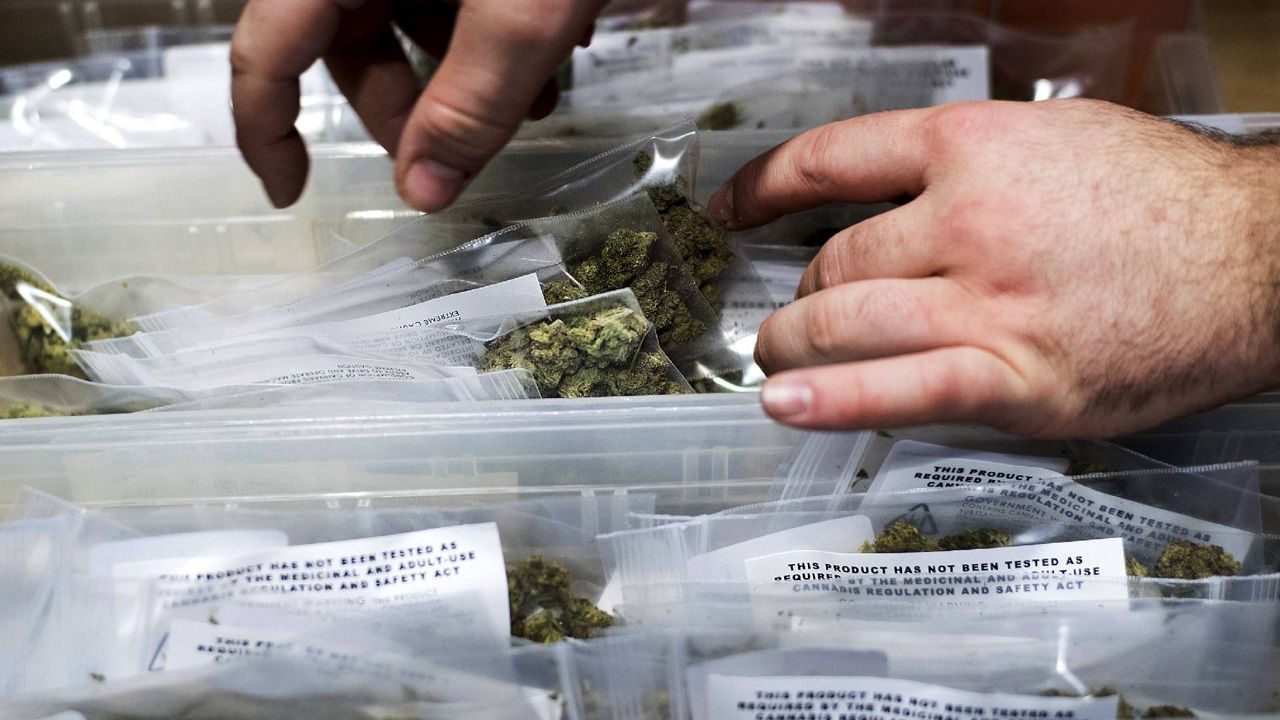OHIO — Ohioans voted to pass Issue 2 in November of last year, officially legalizing recreational marijuana use in December.
Fast forward several months and, while recreational cannabis is technically legal, it’s still not possible to legally purchase weed in the state of Ohio. That will change soon, as the state continues to wade through the logistics and approval processes for the many stages of certified pot production and distribution.
Spectrum News 1 reached out the state’s new Division of Cannabis Control (DCC), which was established in the successful initiative petition, to learn more about the processes that go into establishing a recreational marijuana industry in the state, as well as when Ohioans can buy recreational marijuana.
The deadlines set by the voters in Issue 2 are approaching, and it’s possible we could see certified recreational pot purchases before the end of the summer.
According to the Division of Cannabis Control, initial dual-use applications for non-medical cannabis licensure for current medical permit holders must be available by June 7, with provisional licenses being issued by Sept. 7.
“The new Division of Cannabis Control (DCC) must adopt rules necessary to initially implement the initiated statute within nine months of the effective date. After the DCC issues licenses and those facilities are certified to operate under the new law and rules, the first non-medical marijuana sales can occur.”
Just this week, the Joint Committee on Agency Rule Review approved rules that would clear the way for this process. The division told Spectrum News 1 that this was just the “first of several rule packages that must clear” the committee process for them to meet their deadlines.
When Jim Canepa, the DCC superintendent, was asked about the timeline, he said he didn’t want to give false hope.
“We're following the timeline in the initiated statute,” he said. “We have a small but mighty staff, but there's (a) bandwidth (issue) there.”
In response to Spectrum News 1 questions, the division said they are mandated by the statute's timelines.
“The Division of Cannabis Control is mandated by clear timelines in the voter-initiated statute passed last November,” the division said. “These elements set a course for the availability of dual-use license applications to current medical permit holders by June 7, and the issuance of those dual-use licenses by September 7. The Division of Cannabis Control intends to follow that timeline.”
The DCC recognizes that there is “fluidity” when it comes to the legal implications of this system, and the division says that could influence the timetable.
“...our statutorily defined schedule may encounter adjustments or delays due to potential legislative interventions, legal questions, or additional procedural review during the rules approval phase,” they said.
The DCC specifically highlighted the importance of having a “legal, safe and tested” system, while calling out what they call unregulated, untested and unsafe products with Delta 8 THC. They hope this is something the General Assembly considers if it makes any changes, alongside dealing with the black market and public consumption.
“The DeWine-Husted Administration is taking a proactive stance on cannabis regulation and continues to support legislation to facilitate the legal use of non-medical adult-use cannabis as the voters decided," they said. “But this request of the General Assembly is part of a broader effort calling for tighter control over Delta 8 THC products and public cannabis consumption.”
For those looking to grow marijuana, individuals must be 21 years old or older. The law allows six plants per individual or 12 plants for each household if there are two or more adults living there who are also 21 years old or older.
Growing cannabis at home is allowed if it is by manual or mechanical means; however, it is prohibited to grow cannabis by hydrocarbon-based extraction.
In terms of grams and ounces, a non-medical consumer can possess, transfer and transport 15 grams of extract and 2.5 ounces (about 70.87 g) of another form.
Individuals are not allowed to transport marijuana over state lines, no matter if it is legal, under federal law.
The Ohio Division of Cannabis said the only entities authorized to sell marijuana in the state are the licensed retail dispensaries.
Applications for dual-use licenses must be made available for current medical permit holders by June 7, and provisional licenses must be issued no later than Sept. 7.
However, the Division of Cannabis Control said a business that receives this license is not able to grow, process or sell marijuana until they receive a certificate of operation.
The division said the process for moving from a provisional license to a certificate of operation and the time it takes to do so is dependent on several factors. They note that it will be relatively quick for a facility already operating under medical rules.
“For a licensee who is making major modifications to their building, or for a new dispensary location, the provisional license period would be much longer,” the division said.
The main difference between the three are the sizes, according to the Ohio Division of Cannabis Control.
A level 1 cultivator is allowed to use 100,000 square feet of space
A level 2 cultivator is allowed to use 15,000 square feet of space
A level 3 cultivator is allowed to use 5,000 square feet of space
Additionally, there may be differences in fees required of the cultivators. But all of them must meet the same security, recordkeeping and operational standards.
According to the DCC, each cultivator, processor, testing laboratory and dispensary that has a medical license will also receive a non-medical license for the same location. Each level one medical cultivator will also receive three dispensary licesnes, and level two cultivators will receive one dispensary license.
A non-medical dispensary license will also be given to medical marijuana dispensary’s “not commonly owned or controlled by a cultivator or processor.” These will be for new locations, which the DCC says will be chosen during the application process.
“Finally, 40 level III cultivator licenses and 50 dispensary licenses will be issued to applicants with a preference to participants of the Cannabis Social Equity and Jobs Program, which the statute prescribes to be established by the Department of Development,” the DCC said.
As outlined in the voter-passed initiated statute, this program will be established and managed by the Ohio Department of Development.
According to the Moritz College of Law at Ohio State University, the program "authorizes a fund to study reforms including expungement." The state currently allows for the sealing and expungement of an array of misdemeanors and felonies, and depending on the type of offense, there are various waiting periods.
Additionally, the program will accept and certify participants, with preferences to socially or economically disadvantaged individuals who apply for the program.
Currently, the state of Ohio gives medical licenses to growers and retail storefronts. When Issue 2 passed, it expanded licenses. The state will now include licensing to recreational retail, and 50 adult-use dispensary permits will go toward those who apply for the Cannabis Social Equity and Jobs program.
The Associated Press contributed to this article.






